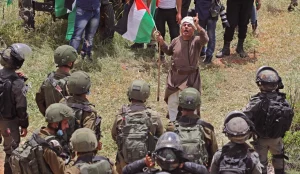The New Intifada in Israel Is Being Silenced

A Palestinian protestor confronts Israeli forces during a demonstration against Israeli settlements during a Nakba Day demonstration, in May.
The Israel Defense Forces is preparing for the future. It is holding a major, extended exercise simulating a war on several fronts. The planned response on each of these fronts is active, the goal a decisive victory, not another containment.
Only on one front, the internal one, does the insidious idea of containment continue to prevail. In the next war, too, the police – this time reinforced by Border Police reservists – will face lynchings, the torching of synagogues and homes, blocking of roads and sieges on military airports.
This is not the route to peace in Israel. He who is afraid to face reality head-on, who denies it, will never overcome it. Every day there are dozens of acts of terrorism in Judea and Samaria: shootings, the throwing of Molotov cocktails and stones, car ramming attacks and break-ins of settlements.
If no one is killed in these terror attacks, it’s as if they didn’t happen, and they are not reported in the national media outlets. The suffering “there,” far from the common Israeli eye, doesn’t interest “here.”
This disregard also creeps through the Green Line. In Little Israel, too – in the Negev, the Galilee, the largely Arab Triangle and the mixed Jewish-Arab cities – an intifada is developing. As long as there are no fatalities, people tend to regard it as if it were “there.”
The main threat (and omen) lie not in the “soft,” physical violence. Police and law enforcement are coping with that, for better or worse (usually worse). An intifada that focuses on ultranationalist incitement, conquers hearts and spreads like wildfire could be the consuming fire.
Against it, however, nothing is being done. And if they do take action, they try to extinguish it with a squirt gun: the very essence of denial and of fleeing from the bitter truth.
One week ago, hundreds of Israeli Palestinians marched through Lod, proudly carrying their national flag, the flag of Palestine, and calling to redeem their homeland from the Zionist occupier with blood and with spirit. The Israel Police were there as an absent presence.
When the marchers passed over the synagogues that they burned last year, without setting fire to them again, the police breathed a sigh of relief. That was also the case at Tel Aviv University.
Dozens of Arab students demonstrated, also with their flags and their anthem, and called for the erasure of the outcome of the Nakba. Similar protests took place in additional concentrations of Palestinians in Israel. The police – by order of the highest ranks of the force, which are blind to tomorrow – generally stood by.
When ultranationalist demonstrations that call for the forcible erasure of the outcome of Israel’s War of Independence (excuse me, the Palestinian Nakba) – that is, to put an end to the Jewish state – are accepted calmly, there can only be one result: Such events will continue to multiply, until they cover the face of the land. And the end? Who can say.
Three Jews were killed in the riots last year, and about 450 were injured (including about 300 police officers). Twenty-three police stations were damaged and 14 fire trucks were put out of commission.
Most of the rioters, the police and the media tried to feed us, were “criminal elements.” Since then, the prosecution has issued 616 indictments. According to an investigative report by Yair Kraus in the Hebrew newspaper Makor Rishon, about 95 percent of the defendants had no previous criminal record.
“If it happens again,” Acre city councilman Bolus Nahas announced at the time, “We will go out again …if it’s a matter that involves the Palestinian people, there is no way to control it.”
This article is published in its entirety
